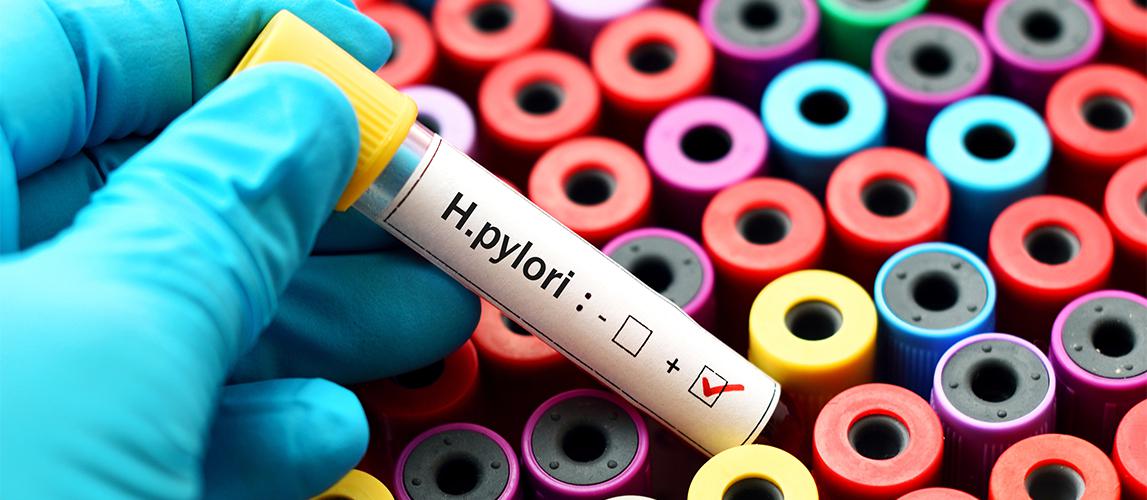N/A

Helicobacter pylori (H. pylori) is a bacteria that can infect and live in the stomach. It was identified for the first time in 1982. It’s presence in the stomach has been linked with gastritis, stomach ulcer and stomach cancer. However, most of the people infected with H. Pylori are not symptomatic and the bacteria does not cause any problems. The infection is more common in developing countries than in Western countries. This is usually a lifelong infection unless it is treated with medicines to eradicate the bacteria.
How do we catch H. pylori ?
The exact mechanism of transmission is not known with certainty. We probably catch it during childhood, from other child or family members. It is very rare to catch H. pylori as an adult, most of the people are infected during childhood. The bacteria stays in the stomach all the life if it is not treated. Possibilities of transmission include sharing food and utensils, contact with contaminated water, contact with vomit or stools from contaminated people.
How to prevent it?
Follow good hygiene practices. Wash hands with soap and water after going to the bathroom and before eating. Eat well washed and well cooked food. Drink water from a clean and safe source. Teach the children to do so.
What can H. pylori do to our body?
H. pylori bacteria can cause inflammation of the lining of the stomach. It can lead to chronic inflammation (gastritis), stomach ulcer and duodenum ulcer. An ulcer is a hole in the gut lining of the stomach or duodenum. H. pylori is the cause of the majority of the stomach and duodenum ulcers. Aspirin and non-steriodal anti-inflammatory drugs overuse can lead to ulcers. Indigestion (dyspepsia) can be caused by chronic inflammation and ulcers, secondary to H. pylori infection. Indigestion can have many other different origins, H. pylori is just one of them.
Some stomach cancers have been suspected to be caused by chronic inflammation and ulcers secondary to H. pylori infection.
Only 10 to 15 per cent of the people with H. pylori infection will develop symptoms or disease. Why some people will develop an ulcer or cancer and some others will not is not known yet.
How to be tested ?
Several tests are available for the diagnostic of H. pylori infection. One of them is a breath test. It analyses a sample of the breathing after drinking a liquid containing a substance called urea. To be accurate, the test must be performed after fasting and without having taken antibiotics and anti-acid/anti-ulcer drugs in the four previous weeks. It is simple and quick to perform.
Another possible test is a simple blood test, it will check for H. pylori antibodies and will say if there is an infection going on. H. pylori can also be detected in the stools, this test analyses a small portion of stool to look for proteins from the bacteria.
Finally, the presence of H. pylori can be checked during gastric endoscopy. The doctor will perform what is called a stomach biopsy, meaning taking a very small piece of the lining of the stomach for microscopic analysis.
To avoid false negative result, all those tests (except for the blood test) must be performed if the patient did not recently take anti-acid or antibiotics drugs, otherwise the test accuracy is not guaranteed.
Which treatment ?
Not everyone who is infected with H. pylori should be treated. Most of infected people do not have symptoms and their stomach is perfectly fine. Those people do not need treatment. For the ones with a gastritis, ulcer or a past history of ulcer, H. pylori should be eradicated. The reason is a successful treatment will promote the healing of the ulcer and will prevent recurrence.
The treatment include a combination of four drugs (three antibiotics and one anti-acid drug). The reason for drug combination is that it is reducing the risk of bacterial resistance to antibiotics and increase the chances for success. The duration of the treatment is usually 14 days. The possible side effects include nausea, bad taste in the mouth, diarrhea, rash and allergic reaction.
Others factors can play a role, for example smoking and drinking alcohol worsen ulcers and slow down healing.
After treatment
After a successful treatment, the risk of being reinfected is very low, the reason is most of infections occur during childhood. Children have a higher chance to get reinfected.
In a majority of people, H. Pylori infection does not cause any problem to the stomach. It could even contribute to the normal balance of the digestive system and have benefits for the body. That is why eradication with antibiotics is only indicated for symptomatic people.
It is usually not recommended to test all the family members if one of them is tested positive for H. pylori infection.— Family Medical Practice
Dr. Mathieu Nalpas - Internist, Family Medical Practice Hanoi
 We use cookies on this website to enhance your user experience
We use cookies on this website to enhance your user experience